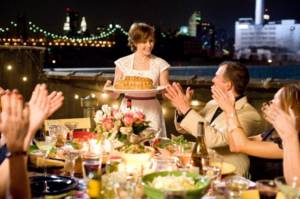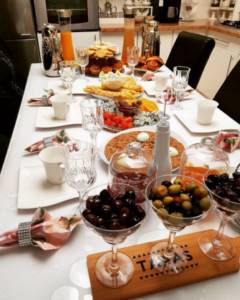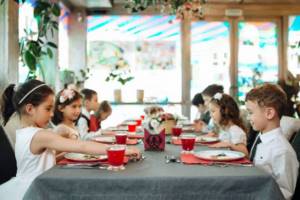How to properly receive guests
It is necessary to thoroughly prepare for the arrival of friends.
Invitation
Preparations for any holiday begin with an invitation. Depending on the celebration, guests are invited in person or by mail. Relatives and friends are invited to family celebrations verbally by phone or at a meeting.
When organizing large celebrations, it is more convenient to use invitations indicating the time and location of the event.
You should inform about the upcoming holiday in advance. People will need time to adjust their plans, choose an outfit and prepare a gift. For example, you can invite someone to a home party a week in advance, and for an anniversary - a month in advance.
Complete pair
It is not customary to invite one of the spouses. The owners call the couple. Exceptions are specific evenings - hen or stag parties.
Guests can ask permission or warn that they want to come with a boyfriend, girlfriend or child. The owners are not always aware of changes in the personal lives of friends. Knowing the number of expected visitors, it is easier to navigate the volume of food and the number of seats at the table.
Time of receipt
The choice of time for the celebration depends on the type of feast. It is customary to invite people for breakfast between 10-12 o'clock. Lunch is served from 15:00 to 19:00, and dinner is served from 19:00 to 22:00. If we are talking about tea drinking, then it is appropriate to invite friends from 17 to 19 hours.
Arrival of guests
It is unacceptable to be late for a celebration. But you shouldn’t arrive early either. If you haven't timed your visit, you can walk around the house for a while.
Guests are allowed to stay no more than 15 minutes.
If they are very late, friends must warn the hosts, who may start the feast without them.
Meeting and introduction
Guests are greeted by both spouses. The owners should be in high spirits. It’s nice to feel the festive mood and cordiality right from the door. A positive attitude helps people relax when they find themselves in unfamiliar company.
According to etiquette, guests are introduced to each other by the owners of the house, calling their names. First, men are introduced to women, and then, as new friends and colleagues arrive, they are introduced to the whole company.
Present
It is customary to give gifts on birthdays and other celebrations. The owners receive them with gratitude and a smile. Boxes are not opened in the hallway. You can view the gift in the living room.
You cannot show by appearance that you do not like the gifted item. If guests presented a gift of food or alcoholic beverages, they should be placed on the table.
Slippers
There are always problems with shoes for guests: there are not enough of them or the size of the slippers does not match. Visitors should take care of what they will wear when visiting.
For friendly gatherings, you can bring your own slippers from home. And for a special event, it is more appropriate for women to take shoes that match their outfit.
Seating at a table
An important point is to place the entire company at the table. At small home events, you can verbally suggest this or that place to guests. At large celebrations, people are given cards indicating their place.
When seating guests, you need to remember the rules:
- The hostess chooses a place to see those present. She should be able to leave the table without disturbing anyone.
- Guests of honor are seated facing the doors in the room.
- It is more appropriate to place people nearby who are interested in communicating with each other.
- In the center you can put a person whom everyone considers the soul of the party, then no one will be bored.
- Sometimes companies gather people who don't like each other. Such guests should not be placed nearby.
Serving
By the time all guests gather, the table must be set. When preparing for the celebration, you need to make sure that each person has a cloth napkin for their clothes and another one for their hands.
Dishes can be served by the hostess, the staff, or the guests themselves (if we are talking about a home feast). Each person needs to have cutlery on the table. The owners of the house begin the feast.
When preparing, carefully calculate the number of devices and chairs so that there is enough space for everyone. To play it safe, you need to anticipate the arrival of more people.

Nice atmosphere
The key to a successful holiday is a pleasant atmosphere at the table. The heroes of the occasion should propose topics for conversation that are of interest to the entire company.
If necessary, the hosts can direct the conversation, because they know all the guests and their hobbies. At the table you cannot talk about the cost of certain products, putting guests in an awkward position. The hosts set the tone for the holiday.
Moderation
Some women are too persistent in offering their friends to try certain dishes. Cultured people gather for the sake of communication. Food is a pleasant addition to conversation, but not an end in itself.
The dishes on the table should not be too fatty and filling. Otherwise, all the guests’ thoughts will be focused not on communication, but on food. The menu can include light salads, canapés, snacks, fruits, nuts, and cold cuts. Overeating kills activity and the desire to communicate.
It is necessary to avoid awkward situations at the table. It is inappropriate to find out taste preferences during a holiday. It is much more logical to ask in advance whether there are any special dietary requirements for all guests.
This does not mean that the hostess needs to adapt to her acquaintances and friends. You can simply create a menu based on the preferences of your guests. This will avoid unpleasant surprises.

Table manners
At the table, alcoholic drinks are often spilled, and sometimes dishes or glasses are broken. The owners are uncomfortable with such situations. But they shouldn't show their feelings.
You need to act as if nothing happened. Then everyone will remain in a festive mood, and the guest will not feel awkward because of the mistake.
Forbidden topics of conversation during a feast
If there is no joker or joker in the company, maintaining the conversation falls on the shoulders of the owners. They know everyone invited. In addition, guests may feel insecure and awkward among strangers.
There are a number of topics that should not be raised at the holiday table:
- problems at work;
- health status;
- issues of religion and politics;
- parenting;
- income level.
You can start a conversation by discussing cultural news, a TV show, a book, a film or a play.
Serving dishes
Drinks are poured and food is served to older women first. The owners are the last to take the food. Cold appetizers are placed on the table before guests arrive. Hot dishes are served after people have tasted the cold cuts, canapés, and salads.
The table is placed in the middle of the room, not in the corner. A mandatory holiday attribute is a tablecloth and beautiful dishes. You should not place large bouquets in the center of the table.
Behind the flowers, guests will not see each other, which is important for communication. A good and useful table decoration is a vase with various fruits.
The feast should not be overloaded with food. It is difficult to place a large number of dishes on the table. The hostess should not force delicacies on guests. Each invitee can take care of filling their own plate.
You cannot insist on drinking alcohol. The dishes are removed from the table quietly, without attracting attention to themselves. Coffee and desserts are served in the same way, and wine glasses are filled.

If the owner of the house needs to leave
Sometimes the owners need to leave for a while. There's nothing wrong with that. It is enough to apologize when getting up from the table. Guests can entertain their friend for a while on their own. But you shouldn't leave the company for a long time. When inviting friends, you must show hospitality.
Seeing off
Farewell to the guests is the final and important stage of the event. You can’t remind people that they’ve been sitting too long. You should not start cleaning by hinting at the end of the evening.
Serving dessert on the table indicates that the celebration is nearing its end. After sweet dishes, guests can linger for another half hour, and then they should get ready to go home.
Tactful owners persuade friends not to rush. But often this is done out of politeness. In everything you need to observe moderation. The celebration should not develop into gatherings until the morning.
Attentive hosts escort guests to the door, handing them clothes.

How to greet guests
So, the apartment is prepared, the table is set - it’s time to welcome guests. In former times, guests were greeted very solemnly, they bowed low and were presented with a loaf of salt and a salt shaker on a towel.
The guests bowed in response, broke off a piece of bread, dipped it in salt and ate it. Then the guests exchanged greeting kisses with the hosts and drank a glass of vodka. Only after that did they enter the house.
The offering of bread and salt was a very symbolic gesture - it meant, first of all, that the hosts were ready to give the guest the most valuable thing they had at home - bread and salt. It is not for nothing that particularly hospitable and generous hosts in former times were called nothing less than “hospitable.”
At the same time, offering bread and salt to guests was also a symbolic wish for wealth, health and prosperity. Salt, in addition, served as a talisman.
In former times, salt was endowed with magical powers: it was believed that it could magically cleanse from everything bad and protect from evil. In some regions of Rus' it was even believed that the expression “bread and salt” in itself drives away misfortune from people. The towel was a symbol of the journey made by the guest and also served as a talisman.
When a guest broke off a piece from a loaf and, dipping it in salt, ate it, he was showing that he shared the life values of the people meeting him, accepted their friendship and was ready to eat “a pound of salt” with them, that is, if necessary, to share everything their troubles and worries. This was also a guarantee that the guest would not harm the hosts. Refusal to accept bread and salt from the owners, in turn, was regarded as an insult.
The tradition in question has survived to this day. This is how parents greet the bride and groom during the wedding ceremony, and this is how they still meet important, high-ranking people.
Hospitality rules for children
The general rules of etiquette for children are not too different from the standard ones. Every child should learn to receive guests from an early age. Adult family members are responsible for the table and organizational aspects.
But children are able to independently meet, see off and entertain their own friends. Further relationships depend on their hospitality.
The child can invite friends to look at books, interesting travel photos, or entertain them with games.
Animators are now often invited to organize children's events and offer active and interesting leisure time. But for a small home event, professional help is not necessary.
Children tend to throw toys around and create chaos while playing. The owners should not express dissatisfaction about this. When inviting guests, it is difficult to expect that the house will be clean.
At the children's table, the child can take on the role of a positive and friendly host. It is not difficult for children to find a topic for conversation, especially if they are the same age. The rules for making friends must be learned from a young age. Such skills will be useful in the future.

What to prepare for guests' arrival
Here it is up to each housewife to decide for herself. During the holiday, feeding and drinking the guest to his fill was the main task for every self-respecting host. When a guest was so full that he could not swallow another bite, the hosts asked, literally begged him to “eat just a little more,” and even knelt in front of especially important guests.
So it doesn’t matter what kind of dishes you prepare - the main thing is to make sure that your guests don’t go hungry. However, here you need to take into account the nature of the event; if you invited friends and acquaintances just “for coffee,” then you are not at all obliged to feed them to their fullest.
In this case, tea or coffee with cake, cookies, candies or other sweets will be more than enough. If the holiday involves a feast, then try to make sure that not a single guest feels left out.
Guest etiquette
When going to an event, you must follow some rules:
- It is inappropriate to be late or arrive before the scheduled time.
- If you are delayed, please notify the hosts.
- You cannot bring strangers to visit.
- The possibility of taking a girl or young man with you is agreed upon in advance with the owners.
- It is appropriate to come to visit with your own replacement shoes.
- .At the table you cannot say that you do not eat certain dishes. You can tactfully refuse them.
- For the sake of the company or owners, people should not drink alcohol if they are supporters of a healthy lifestyle.
- It is not tactful to ask for tea and dessert if you are still interested in hot dishes.
- It is appropriate to help the hostess clear the dishes from the table.
- You cannot ask for treats to take home from the table. This is only permissible if the hostess herself offers the treat.
- You need to get ready to go home 30 minutes after the sweet table.
- The owners are warned in advance about the need to leave early.
We welcome guests to the house. Basic rules of table etiquette

To conclude this lengthy article, let's look at what etiquette rules will be useful to you when welcoming guests to your home:
- When inviting someone for lunch or dinner, you should not start eating first. On the contrary, it is better to ask: how hungry is the guest;
- If you expect an important call during a dinner together, you need to warn your guests about this. It is better to talk on the phone outside the dining room so as not to attract attention;
- Cloth napkins can be tucked into the collar only when serving soup;
- Good restaurants don't serve toothpicks at the table. Because picking out leftover food at the table is indecent;
- At the table, the fork should only be in the left hand, and the knife in the right. A left-handed person cannot hold a knife and fork differently - the rules of etiquette are the same for everyone;
- In Thai cuisine, soups are not a class; they are more like sauces for side dishes. Accordingly, the rice should be dipped into the soup, and not mixed all in one plate;
- It is customary to eat large lettuce leaves with your hands. But only if this is accepted in your company. Ask your table neighbors about this;
- In expensive restaurants, shrimp are eaten only with a fork and knife. Although, of course, this is not necessary to do at home. Again, look at the situation;
- Kuksi or Ramen dishes should be eaten in reverse order. For example, you must first eat meat, noodles and other ingredients, and then drink the broth;
- Women should lick their lips before drinking from a glass, this will minimize the appearance of marks on the glass. If there is still a mark on the glass, you can wipe it with a paper napkin; subsequently, you need to drink only on one side, or apply long-lasting cosmetics on your lips;
- A hamburger is fast food, so eating it with a fork and knife is not necessary. If, nevertheless, you are used to cutting it with cutlery, as an option: pierce the sandwich from top to bottom with a toothpick so that it does not fall apart;
- Georgian khinkali is eaten without a spoon or fork. This national dish is consumed with your hands, wrapping your fingers around the “tail”, biting the side and drinking the broth. The tail is held in the hand all this time;
- You can eat mussels in different ways, both with your hands and with cutlery. Many people agree that you need to find an empty shell, take it in your right hand and take out the meat with it, holding closed mussels in your left.

Hospitality etiquette
The host or hostess should greet guests in the hallway. If one of them is currently preparing dishes, there is no need to leave the kitchen.
The exception is the arrival of an important and honored guest. The greeter's task is to help the guests undress and lead them to the living room, to the festive table.
[ads3]
The appearance of the owners should correspond to the situation: ironed trousers and shirt, a neat dress or suit, order on the head, cleanliness and neatness.
You should not offer guests slippers, as they will look awkward on a man in a suit or a lady in a dress. If the guest himself asked, there is no need to refuse.
I recommend reading Etiquette for Children and Schoolchildren
When seating guests at the table, you should try to seat men and women in alternating order. Married couples can be seated, but lovers cannot.
The most comfortable seats should be offered to the most honored guests: the elderly, parents or close relatives, and superiors.
It is not necessary to seat the hero of the occasion or the owner of the house at the head of the table. Invitees should sit down where it will be convenient to look after the guests and get up from the table.











